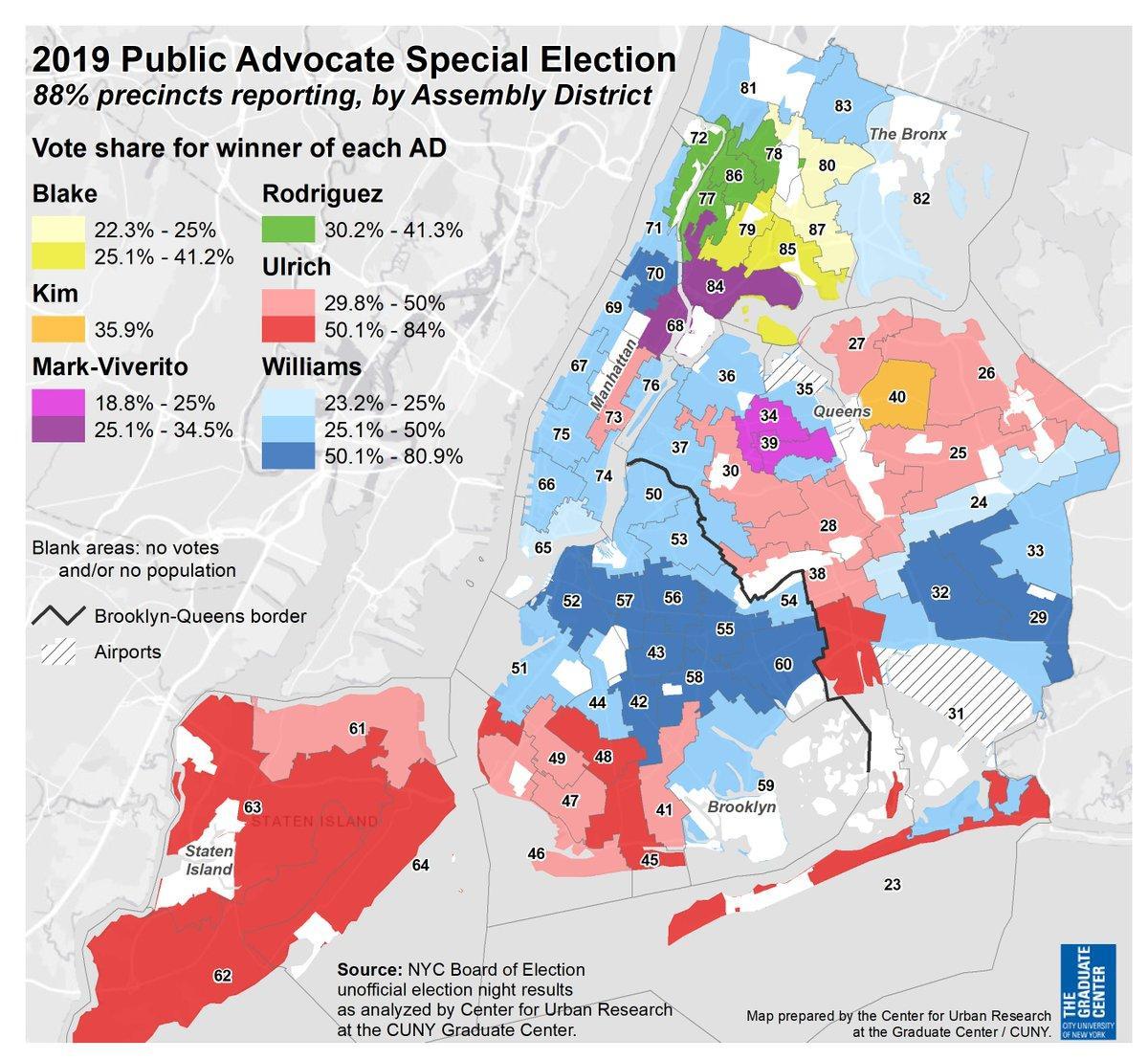Williams Wins Advocate Race, But Ulrich Carries Queens
/A map of election results by state assembly district reveal the ideological divides across Queens and New York City — divides that often cleave along racial and ethnic lines. Map via the CUNY Graduate Center
By David Brand
Brooklyn Councilmember Jumaane Williams won the special election for public advocate by a decisive margin Tuesday night, earning about a third of the votes citywide in the 16-candidate race. Runner-up Eric Ulrich, an Ozone Park councilmember, received about 19 percent the votes citywide.
Ulrich, however, won Queens. He captured 27,442 votes in the borough, compared to Williams’ 21,785 votes, according to the New York City Board of Election’s unofficial results. In total, 402,778 New Yorkers cast their votes in the first-ever special election for citywide office.
“New Yorkers have spoken and they have elected [Jumaane Williams] the public advocate of the city of New York and I’m going to work very closely with him,” Ulrich said in his concession speech Tuesday night. “The good news is, we came in second place … We also won Queens and Staten Island.”
Councilmember Jumaane Williams (left) won the special election for public advocate. Photo via the Williams campaign
Williams received 33.22 percent of the total votes cast in the race to replace former Public Advocate Letitia James, who vacated the seat to assume her role as state attorney general. Ulrich, the lone Republican elected official in the race, received 19.12 percent of the citywide vote.
Election results by Queens assembly district reveal the ideological divides in the borough, and across New York City, that often cleave along racial and ethnic lines. In Queens, Ulrich dominated his home district, which is roughly 50 percent white, while Williams scored large vote totals in majority black neighborhoods in Southeast Queens.
Williams earned 56.2 percent of the vote in AD 32, which includes South Jamaica and Rochdale, and 54.8 percent of votes in AD 29, which includes Laurelton, Rosedale and St. Albans.
Williams also won in Western Queens districts 36 and 37, the places that would have been most affected by the Amazon HQ2 deal. Williams, and most of the other candidates, opposed the deal, which became a key focus of the public advocate race before Amazon cancelled the project earlier this month. Ulrich supported the deal.
Councilmember Eric Ulrich finished second, but earned the most votes in Queens. Photo courtesy of the Ulrich campaign
Former City Council Speaker Melissa Mark-Viverito won two assembly districts — 34 and 39 — with majority Latino populations and Queens Assemblymember Ron Kim won Assembly District 40, which he represents in Albany and which has a majority Asian population.
Ulrich earned his strongest support in Assembly District 23, which overlaps with his council district and includes his home neighborhood of Ozone Park, as well as Broad Channel, Hamilton Beach, Howard Beach, Lindenwood and the Rockaway Peninsula.
Ulrich also won the vote in AD 25, 26, 27, 28 and 30, which cover much of central and northeast Queens.
Williams’ victory was the culmination of a feverish, truncated campaign season that featured dozens of candidate forums over a two-month span.
Williams narrowly lost the Democratic primary for lieutenant governor in September 2018. His strong showing in that election — he won Brooklyn and Manhattan — and his citywide name recognition led several experts to consider him the frontrunner in the special election.
Columbia political science professor Ester Fuchs, a former advisor to Mayor Michael Bloomberg and a Queens resident, cautioned against reading too far into the results of the “quirky” election, however.
“Without putting a damper on Jumaane Williams’ clear victory, this was a very low-turnout, very low-information election at an unusual time of the year when most people aren’t focusing on elections and didn’t even know there was an election — despite great efforts to inform the public — and for an office that, frankly, not a lot of people know what it does,” Fuchs said.
“Willians had almost an incumbency advantage,” she continued. “There was no time for anyone else to break though.”
Fuchs said identity politics also have an major impact on low-turnout elections, especially when the race is a nonpartisan contest. Special election rules prevented candidates from running as Democrats or Republicans so each of the 16 candidates for public advocate ran on nonpartisan party lines. Williams ran on the “It’s Time Let’s Go” line while runner-up Erich Ulrich, a Queens councilmember, ran on the “Common Sense” line.
Ulrich also benefited from a “hometown advantage” in Queens, Fuchs added.
“He won where he was supposed to win,” she said.
Williams was first elected to represent the city’s 45th Council District in 2009. The district includes Flatbush, East Flatbush, Flatlands and Marine Park in Brooklyn.
Other candidates included Brooklyn Councilmember Rafael Espinal, Manhattan Councilmember Ydanis Rodriguez, Bronx Assemblymember Michael Blake, Manhattan Assemblymember Daniel O’Donnell, reporter and activist Nomiki Konst, community activists Helal Sheikh and Anthony Herbert, policy expert Benjamin Yee, Columbia professor David Eisenbach and attorneys Manny Alicandro, Dawn Smalls and Jared Rich.
Brooklyn Assemblymember Latrice Walker appeared on the ballot, but decided not to actively campaign. State election law prevents someone from removing their name from the ballot unless they die or are convicted of a crime.
A day after the election, the next race for public advocate is just getting started.
Candidates can now begin petitioning for the June Democratic and Republican primaries ahead of the November general election.
Williams will serve in office until Dec. 31 unless he wins the primary and general election.






